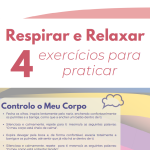
At some point in your life you may come across or have experienced serious and/or potentially traumatic situations, such as natural disasters, accidents, fires, witnessing or being involved in episodes of serious violence, the unexpected loss of a loved one, among others.
It’s important to understand that different reactions can arise when faced with these situations, which deserve special attention.
During the potentially traumatic event or immediately afterwards, negative reactions are to be expected, such as:
- Confusion, disorientation, worry, intrusive thoughts or images, blaming;
- Shock, sadness, fear, anger, shame, numbness, irritability;
- Extreme avoidance of social interaction, interpersonal conflicts;
- Fatigue, headache, muscle tension, stomach ache, increased heart rate, sleep difficulties.
On the other hand, it may be that being faced with situations of this kind triggers positive reactions in you that make you feel involved, challenged and ready to act with optimism, developing a sense of competence. It can also change some of your perspectives on life and the world, leading you to put certain difficulties into perspective and to prioritize the quality time you dedicate to yourself and your loved ones.
In any case, the experience of such a situation can be very difficult to manage and some of your negative reactions may linger over time or only manifest themselves later.
If you are faced with a potentially traumatic situation, seek help immediately or allow yourself to be helped, whatever reaction you are having at the time. Processing the events you have just witnessed can help prevent more serious consequences in the future!
Here you can find more examples of reactions to exposure to potentially traumatic situations and possible strategies to adopt to better manage these moments.
Source: Psychological First Aid, FIPJ Order of Portuguese Psychologists
Grief
Grieving and the loss of someone significant can be particularly challenging and generate very intense physical and emotional reactions.
Faced with the news of the death of someone important to you, you may feel various sensations: intense sadness; confusion; anger at the event, the person who died or those considered responsible for the person’s death; nausea, tremors, muscle weakness; guilt for still being alive; thinking about the person who died, even when you don’t want to; longing and wanting to look for the person who died.
It’s important to understand that these are natural reactions in the first moments after the death of a loved one. Don’t stop yourself from seeking support or the company of close people in these situations, allow yourself to feel all the emotions and maintain healthy habits (rest, meals, schedules, positive distracting activities, etc.). If the negative thoughts, feelings and reactions persist for a few months, interfering with your functioning in a significant way, you should seek professional psychological or psychiatric help.
Schedule an appointment with us if you are experiencing any difficulties of this kind.
Source: Psychological First Aid, FIPJ Order of Portuguese Psychologists
Breathing and Relaxing
Breathing and relaxation exercises are often mentioned as effective behavioral strategies for controlling moments of greater emotional dysregulation. Through their practice, it is possible to better recognize states of tension in everyday life and reduce them, preventing them from becoming harmful.
Exercising your breathing and being attentive to your body helps not only to stabilize the physical part, but also to give the mind a sense of calm and control over itself, which can then extend to a perception of greater control over the situation you may be experiencing.
There are countless ways to achieve relaxation, from muscle stimulation exercises and breathing control to meditation, stretching, listening to relaxing music, going for a walk in the fresh air, or others that work on an individual level. To practice muscle stimulation and breathing exercises, you should look for a calm, quiet place and/or focus on yourself.
Because we are all different, we react differently to circumstances and there may be techniques that work better or worse for each person, we leave you with 4 examples of relaxation and breathing exercises that you can practice and implement whenever you feel the need!
Check out and save the infographic: Breathing and Relaxing

